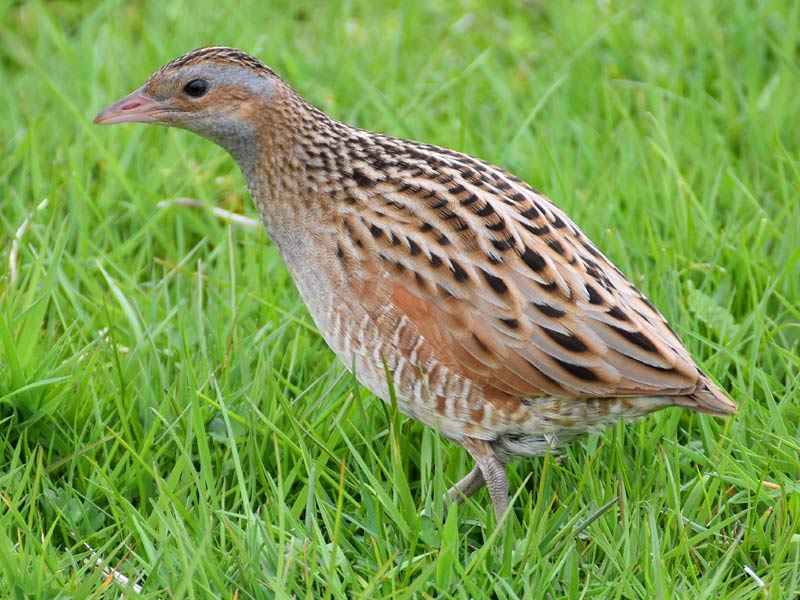RSPB Scotland’s annual survey of corncrakes recorded only 824 calling males in 2022, compared to 850 in 2021, reflecting the ongoing challenges the species is facing. While this three percent decline is smaller than some of the previous recent year on year reductions it is a continuation of a worrying overall downward trend since the record high of 1289 males in 2014.
Corncrakes are counted across 16 areas in Scotland, with surveyors listening out for the distinctive “crex crex” call of the male birds. There are regional differences in the results this year with the Inner Hebrides seeing a rise of 3.7 per cent compared to 2021, but this increase was offset by decreases in other areas including the Outer Hebrides that saw a big 10.1 per cent fall.
Corncrakes are incredibly elusive birds that migrate here every summer from Africa. They used to be found across the UK but changes in agricultural practices in the 19th and 20th century saw their range and numbers contract to just a few isolated pockets in Scotland.

Corncrake, copyright Jim Swalwell, from the surfbirds galleries
Their ongoing survival here has been the result of farmers and crofters being supported through Scottish Government agricultural payments to manage their land in corncrake friendly ways, such as planting vegetation to provide the birds with cover, delaying mowing, and mowing fields from the inside out to allow birds hiding in the crops to escape to the edges.
With huge changes to Scotland’s agricultural funding systems currently being consulted on by Scottish Government, it is vital that what emerges will deliver better long-term support for farmers and crofters to manage their land in ways that benefit corncrakes to safeguard the species here as well as helping other wildlife, climate, and people.
Chris Bailey, RSPB Scotland’s Advisory Manager said: “Whilst the 2022 survey results are only a slight reduction from the year before, it’s really concerning that overall corncrake numbers are down by a third since 2014. We’re at a crucial point for helping the species and it’s vital that the farmers and crofters whose land they depend on are supported properly.
“Scottish Government has the ambition to be a global leader in sustainable and regenerative agriculture. It is currently consulting on proposals that will shape how farm funding is spent in future and intends to introduce new legislation to make this possible. We urge everyone who wants to see more of this funding used to support nature and climate friendly farming to sign the Farm For Scotland’s Future petition and let the Government know what you think.
“Since a new system of farm payments won’t be in place until 2026, the Scottish Government must continue to provide adequate funding in the meantime for the Agri-Environment-Climate Scheme which supports the management of farmland for corncrakes and other wildlife.”
The RSPB Scotland led Corncrake Calling project is supported by The National Lottery Heritage Fund, thanks to National Lottery players. The project builds on the decades of work the conservation charity has done with farmers and crofters to help corncrakes by continuing its advisory role and engaging with local corncrake communities and people across the country to learn about these birds and be inspired by their plight to help them.
Over 25 management agreements and over 280 corncrake initiatives have been arranged through the project for farmers and crofters. A recent advocacy workshop run by the project involved people from a range of organisations including Scottish Government, NatureScot, conservation bodies and individual farmers and crofters. It looked at the development of longer-term action plan for the species which will extend beyond the life of the project in its current form, vital for the corncrake survival in Scotland.
Operation: Broken Feather, a touring exhibition co-designed by the project with high schools across Scotland recently opened at Dumfries Museum, and will be visiting places across the country for the next two years to raise awareness about corncrakes.
Jane Shadforth, Project Manager – Corncrake Calling project said: “It’s incredible to see how passionate people are about saving corncrakes in Scotland. From communities at the heart of our small corncrake populations to those living elsewhere who are discovering them for the first time, so many people are inspired to help them. Our project volunteers are an amazing group, and we’d like to thank them for all their efforts. We’re at a pivotal point for corncrakes and it’s vital the necessary plans and practices are put in place now to ensure they are still here for centuries to come.”
Members of the public can join Scottish Environment LINK’s campaign urging the Scottish Government to develop a new system of farm funding that works for nature, climate and people by signing the Farm For Scotland’s Future petition here.